2014年高考真题——英语(江苏卷) Word版含答案
- 格式:doc
- 大小:2.67 MB
- 文档页数:13
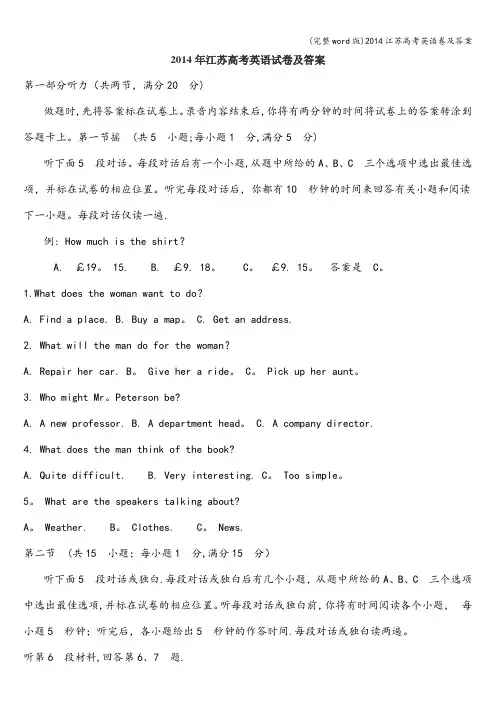
2014年江苏高考英语试卷及答案第一部分听力(共两节,满分20 分)做题时,先将答案标在试卷上。
录音内容结束后,你将有两分钟的时间将试卷上的答案转涂到答题卡上。
第一节摇(共5 小题;每小题1 分,满分5 分)听下面5 段对话。
每段对话后有一个小题,从题中所给的A、B、C 三个选项中选出最佳选项,并标在试卷的相应位置。
听完每段对话后,你都有10 秒钟的时间来回答有关小题和阅读下一小题。
每段对话仅读一遍.例: How much is the shirt?A. £19。
15.B. £9. 18。
C。
£9. 15。
答案是C。
1.What does the woman want to do?A. Find a place.B. Buy a map。
C. Get an address.2. What will the man do for the woman?A. Repair her car. B。
Give her a ride。
C。
Pick up her aunt。
3. Who might Mr。
Peterson be?A. A new professor.B. A department head。
C. A company director.4. What does the man think of the book?A. Quite difficult.B. Very interesting. C。
Too simple。
5。
What are the speakers talking about?A。
Weather. B。
Clothes. C。
News.第二节(共15 小题;每小题1 分,满分15 分)听下面5 段对话或独白.每段对话或独白后有几个小题,从题中所给的A、B、C 三个选项中选出最佳选项,并标在试卷的相应位置。
听每段对话或独白前,你将有时间阅读各个小题,每小题5 秒钟;听完后,各小题给出5 秒钟的作答时间.每段对话或独白读两遍。
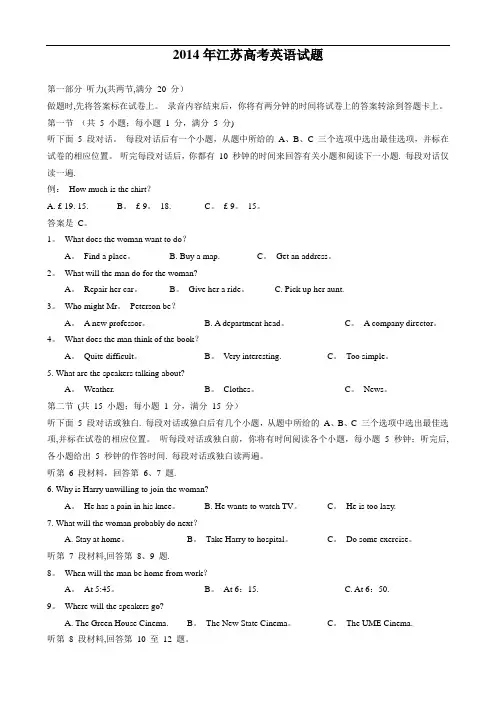
2014年江苏高考英语试题第一部分听力(共两节,满分20 分)做题时,先将答案标在试卷上。
录音内容结束后,你将有两分钟的时间将试卷上的答案转涂到答题卡上。
第一节(共5 小题;每小题 1 分,满分5 分)听下面5 段对话。
每段对话后有一个小题,从题中所给的A、B、C 三个选项中选出最佳选项,并标在试卷的相应位置。
听完每段对话后,你都有10 秒钟的时间来回答有关小题和阅读下一小题. 每段对话仅读一遍.例:How much is the shirt?A. £ 19. 15. B。
£ 9。
18. C。
£ 9。
15。
答案是C。
1。
What does the woman want to do?A。
Find a place。
B. Buy a map. C。
Get an address。
2。
What will the man do for the woman?A。
Repair her car。
B。
Give her a ride。
C. Pick up her aunt.3。
Who might Mr。
Peterson be?A。
A new professor。
B. A department head。
C。
A company director。
4。
What does the man think of the book?A。
Quite difficult。
B。
Very interesting. C。
Too simple。
5. What are the speakers talking about?A。
Weather. B。
Clothes。
C。
News。
第二节(共15 小题;每小题 1 分,满分15 分)听下面5 段对话或独白. 每段对话或独白后有几个小题,从题中所给的A、B、C 三个选项中选出最佳选项,并标在试卷的相应位置。
听每段对话或独白前,你将有时间阅读各个小题,每小题 5 秒钟;听完后,各小题给出5 秒钟的作答时间. 每段对话或独白读两遍。
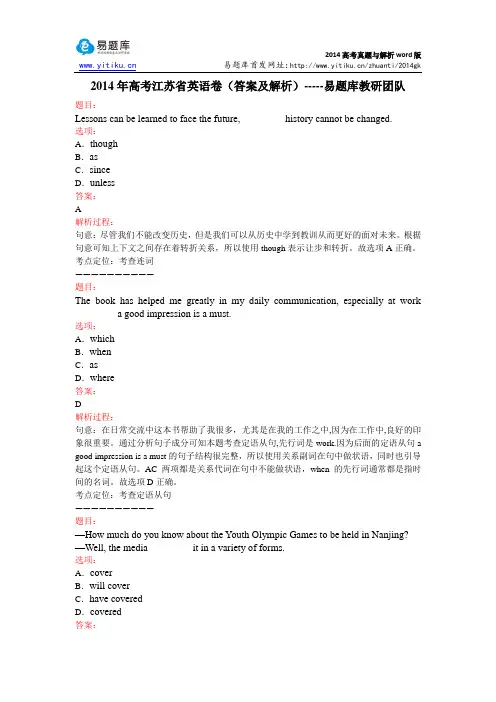
2014年高考江苏省英语卷(答案及解析)-----易题库教研团队题目:Lessons can be learned to face the future, ________ history cannot be changed.选项:A.thoughB.asC.sinceD.unless答案:A解析过程:句意:尽管我们不能改变历史,但是我们可以从历史中学到教训从而更好的面对未来。
根据句意可知上下文之间存在着转折关系,所以使用though表示让步和转折。
故选项A正确。
考点定位:考查连词——————————题目:The book has helped me greatly in my daily communication, especially at work ________ a good impression is a must.选项:A.whichB.whenC.asD.where答案:D解析过程:句意:在日常交流中这本书帮助了我很多,尤其是在我的工作之中,因为在工作中,良好的印象很重要。
通过分析句子成分可知本题考查定语从句,先行词是work.因为后面的定语从句a good impression is a must的句子结构很完整,所以使用关系副词在句中做状语,同时也引导起这个定语从句。
AC两项都是关系代词在句中不能做状语,when的先行词通常都是指时间的名词。
故选项D正确。
考点定位:考查定语从句——————————题目:—How much do you know about the Youth Olympic Games to be held in Nanjing? —Well, the media ________ it in a variety of forms.选项:A.coverB.will coverC.have coveredD.covered答案:C解析过程:句意:—你对即将在南京举行的青年奥运会了解多少?—了解的不少,媒体已经以多种形式对青年奥运会举进行了报道。
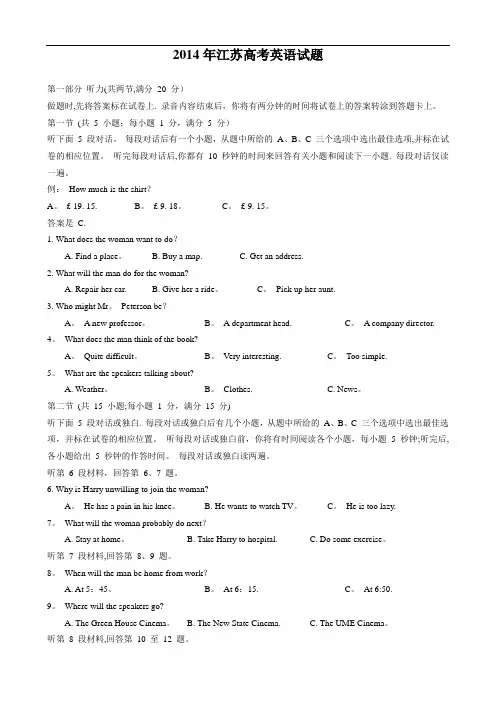
2014年江苏高考英语试题第一部分听力(共两节,满分20 分)做题时,先将答案标在试卷上. 录音内容结束后,你将有两分钟的时间将试卷上的答案转涂到答题卡上。
第一节(共5 小题;每小题 1 分,满分5 分)听下面5 段对话。
每段对话后有一个小题,从题中所给的A、B、C 三个选项中选出最佳选项,并标在试卷的相应位置。
听完每段对话后,你都有10 秒钟的时间来回答有关小题和阅读下一小题. 每段对话仅读一遍。
例:How much is the shirt?A。
£ 19. 15. B。
£ 9. 18。
C。
£ 9. 15。
答案是C.1. What does the woman want to do?A. Find a place。
B. Buy a map.C. Get an address.2. What will the man do for the woman?A. Repair her car.B. Give her a ride。
C。
Pick up her aunt.3. Who might Mr。
Peterson be?A。
A new professor。
B。
A department head. C。
A company director. 4。
What does the man think of the book?A。
Quite difficult。
B。
Very interesting. C。
Too simple.5。
What are the speakers talking about?A. Weather。
B。
Clothes. C. News。
第二节(共15 小题;每小题 1 分,满分15 分)听下面5 段对话或独白. 每段对话或独白后有几个小题,从题中所给的A、B、C 三个选项中选出最佳选项,并标在试卷的相应位置。
听每段对话或独白前,你将有时间阅读各个小题,每小题 5 秒钟;听完后,各小题给出5 秒钟的作答时间。

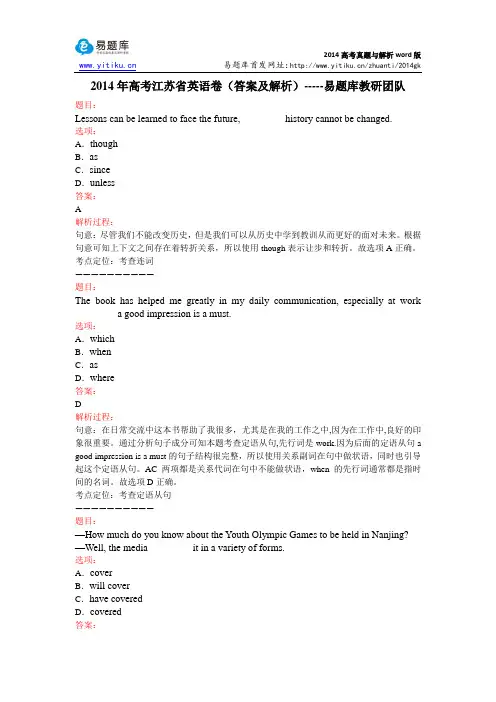
2014年高考江苏省英语卷(答案及解析)-----易题库教研团队题目:Lessons can be learned to face the future, ________ history cannot be changed.选项:A.thoughB.asC.sinceD.unless答案:A解析过程:句意:尽管我们不能改变历史,但是我们可以从历史中学到教训从而更好的面对未来。
根据句意可知上下文之间存在着转折关系,所以使用though表示让步和转折。
故选项A正确。
考点定位:考查连词——————————题目:The book has helped me greatly in my daily communication, especially at work ________ a good impression is a must.选项:A.whichB.whenC.asD.where答案:D解析过程:句意:在日常交流中这本书帮助了我很多,尤其是在我的工作之中,因为在工作中,良好的印象很重要。
通过分析句子成分可知本题考查定语从句,先行词是work.因为后面的定语从句a good impression is a must的句子结构很完整,所以使用关系副词在句中做状语,同时也引导起这个定语从句。
AC两项都是关系代词在句中不能做状语,when的先行词通常都是指时间的名词。
故选项D正确。
考点定位:考查定语从句——————————题目:—How much do you know about the Youth Olympic Games to be held in Nanjing? —Well, the media ________ it in a variety of forms.选项:A.coverB.will coverC.have coveredD.covered答案:C解析过程:句意:—你对即将在南京举行的青年奥运会了解多少?—了解的不少,媒体已经以多种形式对青年奥运会举进行了报道。
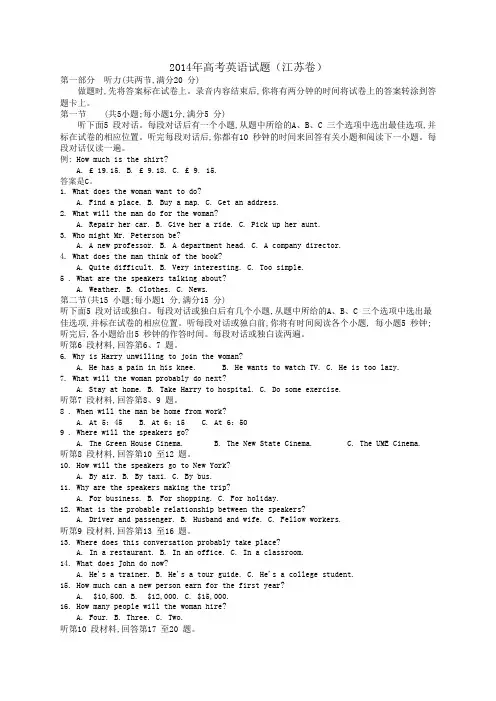
2014年高考英语试题(江苏卷)第一部分听力(共两节,满分20 分)做题时,先将答案标在试卷上。
录音内容结束后,你将有两分钟的时间将试卷上的答案转涂到答题卡上。
第一节 (共5小题;每小题1分,满分5 分)听下面5 段对话。
每段对话后有一个小题,从题中所给的A、B、C 三个选项中选出最佳选项,并标在试卷的相应位置。
听完每段对话后,你都有10 秒钟的时间来回答有关小题和阅读下一小题。
每段对话仅读一遍。
例: How much is the shirt?A. £ 19.15.B. £ 9.18.C. £ 9. 15.答案是C。
1. What does the woman want to do?A. Find a place.B. Buy a map.C. Get an address.2. What will the man do for the woman?A. Repair her car.B. Give her a ride.C. Pick up her aunt.3. Who might Mr. Peterson be?A. A new professor.B. A department head.C. A company director.4. What does the man think of the book?A. Quite difficult.B. Very interesting.C. Too simple.5 . What are the speakers talking about?A. Weather.B. Clothes.C. News.第二节(共15 小题;每小题1 分,满分15 分)听下面5 段对话或独白。
每段对话或独白后有几个小题,从题中所给的A、B、C 三个选项中选出最佳选项,并标在试卷的相应位置。
听每段对话或独白前,你将有时间阅读各个小题, 每小题5 秒钟;听完后,各小题给出5 秒钟的作答时间。
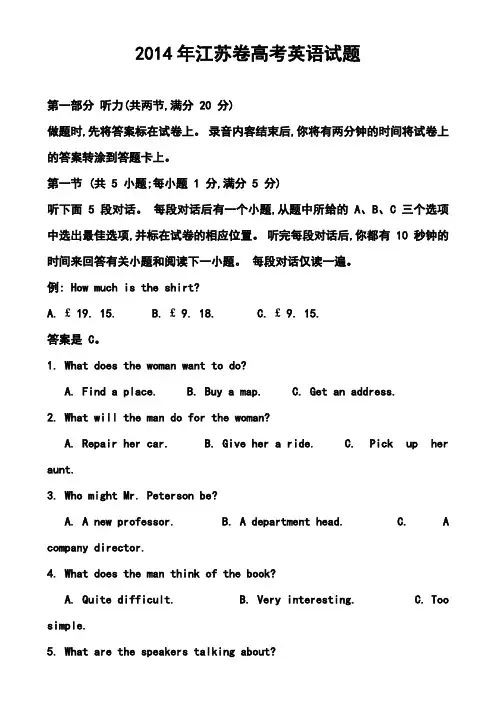
2014年江苏卷高考英语试题第一部分听力(共两节,满分 20 分)做题时,先将答案标在试卷上。
录音内容结束后,你将有两分钟的时间将试卷上的答案转涂到答题卡上。
第一节 (共 5 小题;每小题 1 分,满分 5 分)听下面 5 段对话。
每段对话后有一个小题,从题中所给的 A、B、C 三个选项中选出最佳选项,并标在试卷的相应位置。
听完每段对话后,你都有 10 秒钟的时间来回答有关小题和阅读下一小题。
每段对话仅读一遍。
例: How much is the shirt?A. £ 19. 15.B. £ 9. 18.C. £ 9. 15.答案是 C。
1. What does the woman want to do?A. Find a place.B. Buy a map.C. Get an address.2. What will the man do for the woman?A. Repair her car.B. Give her a ride.C. Pick up her aunt.3. Who might Mr. Peterson be?A. A new professor.B. A department head.C. A company director.4. What does the man think of the book?A. Quite difficult.B. Very interesting.C. Too simple.5. What are the speakers talking about?A. Weather.B. Clothes.C. News.第二节 (共 15 小题;每小题 1 分,满分 15 分)听下面 5 段对话或独白。
每段对话或独白后有几个小题,从题中所给的 A、B、C 三个选项中选出最佳选项,并标在试卷的相应位置。
听每段对话或独白前,你将有时间阅读各个小题,每小题 5 秒钟;听完后,各小题给出 5 秒钟的作答时间。
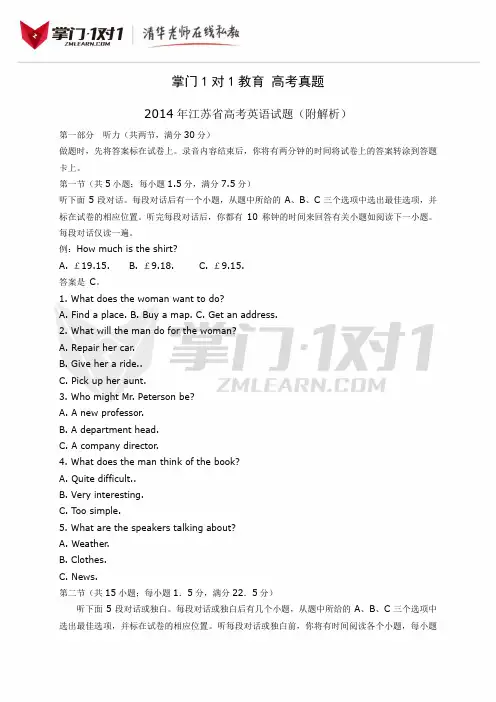
掌门1对1教育高考真题2014年江苏省高考英语试题(附解析)第一部分听力(共两节,满分30分)做题时,先将答案标在试卷上。
录音内容结束后,你将有两分钟的时间将试卷上的答案转涂到答题卡上。
第一节(共5小题;每小题1.5分,满分7.5分)听下面5段对话。
每段对话后有一个小题,从题中所给的A、B、C三个选项中选出最佳选项,并标在试卷的相应位置。
听完每段对话后,你都有10称钟的时间来回答有关小题如阅读下一小题。
每段对话仅读一遍。
例:How much is the shirt?A. £19.15.B. £9.18.C. £9.15.答案是C。
1. What does the woman want to do?A. Find a place.B. Buy a map.C. Get an address.2. What will the man do for the woman?A. Repair her car.B. Give her a ride..C. Pick up her aunt.3. Who might Mr. Peterson be?A. A new professor.B. A department head.C. A company director.4. What does the man think of the book?A. Quite difficult..B. Very interesting.C. Too simple.5. What are the speakers talking about?A. Weather.B. Clothes.C. News.第二节(共15小题;每小题1.5分,满分22.5分)听下面5段对话或独白。
每段对话或独白后有几个小题,从题中所给的A、B、C三个选项中选出最佳选项,并标在试卷的相应位置。
听每段对话或独白前,你将有时间阅读各个小题,每小题5秒钟;听完后,各小题将给出5秒钟的作答时间。
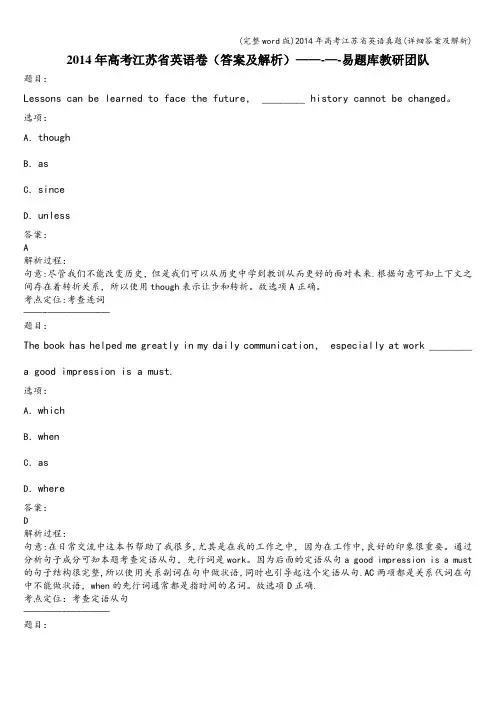
2014年高考江苏省英语卷(答案及解析)——-—-易题库教研团队题目:Lessons can be learned to face the future, ________ history cannot be changed。
选项:A.thoughB.asC.sinceD.unless答案:A解析过程:句意:尽管我们不能改变历史,但是我们可以从历史中学到教训从而更好的面对未来.根据句意可知上下文之间存在着转折关系,所以使用though表示让步和转折。
故选项A正确。
考点定位:考查连词——-—————-—题目:The book has helped me greatly in my daily communication, especially at work ________ a good impression is a must.选项:A.whichB.whenC.asD.where答案:D解析过程:句意:在日常交流中这本书帮助了我很多,尤其是在我的工作之中,因为在工作中,良好的印象很重要。
通过分析句子成分可知本题考查定语从句,先行词是work。
因为后面的定语从句a good impression is a must 的句子结构很完整,所以使用关系副词在句中做状语,同时也引导起这个定语从句.AC两项都是关系代词在句中不能做状语,when的先行词通常都是指时间的名词。
故选项D正确.考点定位:考查定语从句————-—-———题目:—How much do you know about the Youth Olympic Games to be held in Nanjing?-Well, the media ________ it in a variety of forms。
选项:A.coverB.will coverC.have coveredD.covered答案:C解析过程:句意:—你对即将在南京举行的青年奥运会了解多少?—了解的不少,媒体已经以多种形式对青年奥运会举进行了报道。
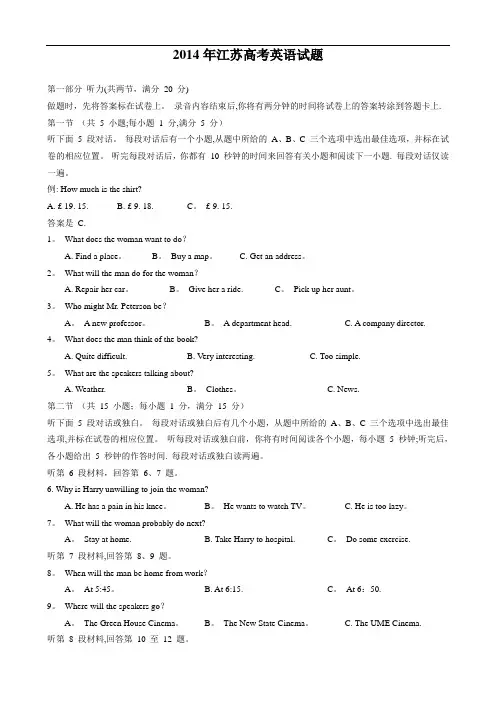
2014年江苏高考英语试题第一部分听力(共两节,满分20 分)做题时,先将答案标在试卷上。
录音内容结束后,你将有两分钟的时间将试卷上的答案转涂到答题卡上.第一节(共5 小题;每小题 1 分,满分 5 分)听下面5 段对话。
每段对话后有一个小题,从题中所给的A、B、C 三个选项中选出最佳选项,并标在试卷的相应位置。
听完每段对话后,你都有10 秒钟的时间来回答有关小题和阅读下一小题. 每段对话仅读一遍。
例: How much is the shirt?A. £ 19. 15.B. £ 9. 18. C。
£ 9. 15.答案是C.1。
What does the woman want to do?A. Find a place。
B。
Buy a map。
C. Get an address。
2。
What will the man do for the woman?A. Repair her car。
B。
Give her a ride. C。
Pick up her aunt。
3。
Who might Mr. Peterson be?A。
A new professor。
B。
A department head. C. A company director.4。
What does the man think of the book?A. Quite difficult.B. Very interesting.C. Too simple.5。
What are the speakers talking about?A. Weather. B。
Clothes。
C. News.第二节(共15 小题;每小题 1 分,满分15 分)听下面5 段对话或独白。
每段对话或独白后有几个小题,从题中所给的A、B、C 三个选项中选出最佳选项,并标在试卷的相应位置。
听每段对话或独白前,你将有时间阅读各个小题,每小题5 秒钟;听完后,各小题给出5 秒钟的作答时间. 每段对话或独白读两遍。
2014年普通高等学校招生全国统一考试(江苏卷)第二部分:英语知识运用(共两节,满分35分)第一节:单项填空(共15小题;每小题1分,满分15分)请阅读下面各题,从题中所给的A、B、C、D四个选项中,选出最佳选项。
21.[2014·江苏卷] Lessons can be learned to face the future, ________ history cannot be changed.A.though B.asC.since D.unless21.A考查状语从句连接词的用法。
句意:尽管历史不可能被改变,但是我们可以吸取教训来迎接未来。
根据语境可知此处用though引导让步状语从句,故A项正确。
22.[2014·江苏卷] The book has helped me greatly in my daily communication, especially at work ________ a good impression is a must.A.which B.whenC.as D.where22.D考查定语从句。
句意:这本书在我的日常交流方面给予了我很大帮助,尤其是在必须给别人留下一个好印象的工作中。
分析句子结构可知,先行词为抽象名词work,定语从句中缺少地点状语,故用where引导。
23.[2014·江苏卷] —How much do you know about the Youth Olympic Games to be held in Nanjing?—Well, the media ________ it in a variety of forms.A.cover B.will coverC.have covered D.covered23.C考查动词的时态与语态。
句意:“你对于即将在南京召开的青奥会知道多少?”“哦,媒体已经以多种多样的形式对其进行了报道。
2014年江苏高考英语试卷(含答2014 年江苏高考英语试题第一部分听力(共两节,满分20 分)做题时,先将答案标在试卷上。
录音内容结束后,你将有两分钟的时间将试卷上的答案转涂到答题卡上。
第一节(共 5 小题;每小题 1 分,满分 5 分)听下面 5 段对话。
每段对话后有一个小题,从题中所给的 A 、B、C 三个选项中选出最佳选项,并标在试卷的相应位置。
听完每段对话后,你都有10 秒钟的时间来回答有关小题和阅读下一小题。
每段对话仅读一遍。
例: How much is the shirt?A. £9. 15.B. 2 18.C.妇.15.答案是C。
1. What does the woman want to do?A. Find a place.B. Buy a map.C. Get an address.2. What will the man do for the woman?A. Repair her car.B. Give her a ride.C. Pick up her aunt.3. Who might Mr. Peterson be?A. A new professor.B. A department head.C. A company director.4. What does the man think of the book?A. Quite difficult.B. Very interesting.C. Too simple.5. What are the speakers talking about?A. Weather.B. Clothes.C. News. 第二节(共15 小题;每小题1 分,满分15 分)听下面 5 段对话或独白。
每段对话或独白后有几个小题,从题中所给的A、B、C 三个选项中选出最佳选项,并标在试卷的相应位置。
听每段对话或独白前,你将有时间阅读各个小题,每小题 5 秒钟; 听完后,各小题给出5 秒钟的作答时间。
2014年江苏高考英语试题第一节: 单项填空(共15 小题; 每小题1 分, 满分15 分)21. Lessons can be learned to face the future, ________ history cannot be changed.A. thoughB. asC. sinceD. unless22. The book has helped me greatly in my daily communication, especially at work ________ a good impression is a must.A. whichB. whenC. asD. where23. —How much do you know about the Youth Olympic Games to be held in Nanjing?—Well, the media ________ it in a variety of forms.A. coverB. will coverC. have coveredD. covered24. Tom always goes jogging in the morning and he usually does push-ups too to stay ________.A. in placeB. in orderC. in shapeD. in fashion25. Top graduates from universities are ________ by major companies.A. chasedB. registeredC. offeredD. compensated26. —What a mess! You are always so lazy!—I’m not to blame, mum. I am ________ you have made me.A. howB. whatC. thatD. who27. She was put under house arrest two years ago but remained a powerful ________ in la st year’s election.A. symbolB. portraitC. identityD. statue28. The idea “happiness, ” ________, will not sit still for easy definition.A. to be rigidB. to be sureC. to be perfectD. to be fair29. The lecture ________, a lively question-and-answer session followed.A. being givenB. having givenC. to be givenD. having been given30. —Dad, I don’t think Oliver the right sort of person for the job.—I see. I’ll go right away and ________.A. pay him backB. pay him offC. put him awayD. put him off31. It was sad to me that they, so poor themselves, ________ bring me food.A. mightB. wouldC. shouldD. could32. I can’t meet you on Sunday. I’ll be ________ occupied.A. alsoB. justC. neverthelessD. otherwise33. Legend has it that the origin of the Dragon Boat Festival is to ________ the soul of Qu Yuan.A. rememberB. remindC. recoverD. recall34. Good families are much to all their members, but ________ to none.A. somethingB. anythingC. everythingD. nothing35. —________ ! Somebody has left the lab door open.—Don’t look at me.A. Dear meB. Hi, thereC. Thank goodnessD. Come on第二节: 完形填空(共20 小题; 每小题1 分, 满分20 分)Dale Carnegie rose from the unknown of a Missouri farm to international fame because he found a way to fill a universal human need.It was a need that he first 36 back in 1906 when young Dale was a junior at State Teachers College in Warrensburg. To get an 37 , he was struggling against many difficulties. His family was poor. His Dad couldn’t afford the 38 at college, so Dale had to ride horseback 12 miles to attend classes. Study had to be done 39 his farm-work routines. He withdrew from many school activities 40 he didn’t have the time or the 41 . He had only one good suit. He tried 42 the football team, but the coach turned him down for being too 43 . During this period Dale was slowly 44 an inferiority complex (自卑感), which his mother knew could 45 him from achieving his real potential. She 46 that Dale join the debating team, believing that 47 in speaking could give him the confidence and recognition that he needed.Dale took his mother’s advice, tried desperately and after several attempts 48 made it. This proved to be a 49 point in his life. Speaking before groups did help him gain the 50 he needed. By the time Dale was a senior, he had won every top honor in 51 . Now other students were coming to him for coaching and they, 52 , were winning contests.Out of this early struggle to 53 his feelings of inferiority, Dale came to understand that the ability to 54 an idea to an audience builds a person’s confidence. And, 55 it, Dale knew he could do anything he wanted to do—and so could others.36. A. admitted B. filled C. supplied D. recognized37. A. assignment B. education C. advantage D. instruction38. A. training B. board C. teaching D. equipment39. A. between B. during C. over D. through40. A. while B. when C. because D. though41. A. permits B. interest C. talent D. clothes42. A. on B. for C. in D. with43. A. light B. flexible C. optimistic D. outgoing44. A. gaining B. achieving C. developing D. obtaining45. A. prevent B. protect C. save D. free46. A. suggested B. demanded C. required D. insisted47. A. presence B. practice C. patience D. potential48. A. hopefully B. certainly C. finally D. naturally49. A. key B. breaking C. basic D. turning50. A. progress B. experience C. competence D. confidence51. A. horse-riding B. football C. speech D. farming52. A. in return B. in brief C. in turn D. in fact53. A. convey B. overcome C. understand D. build54. A. express B. stress C. contribute D. repeat55. A. besides B. beyond C. like D. with第三部分: 阅读理解(共15 小题; 每小题2 分, 满分30 分)请阅读下列短文, 从短文后各题所给的A、B、C、D 四个选项中, 选出最佳选项, 并在答题卡上将该项涂黑。
2014高考英语江苏卷试题及答案(word版)Dachieving his real potential. She 46 that Dale join the debating team, believing that 47 in speaking could give him the confidence and recognition that he needed.Dale took his mother's advice, tried desperately and after several attempts 48 made it. This proved to be a 49 point in his life. Speaking before groups did help him gain the 50 he needed. By the time Dale was a senior, he had won every top honor in 51 . Now other students were coming to him for coaching and they, 52 , were winning contests.Out of this early struggle to 53 his feelings of inferiority, Dale came to understand that the ability to 54 an idea to an audience builds a person's confidence. And, 55 it, Dale knewhe could do anything he wanted to do—and so could others.36. A. admitted B. filled C. supplied D. recognized37. A. assignment B. education C. advantage D. instruction38. A. training B. board C. teaching D. equipment39. A. between B. during C. over D. through40. A. while B. when C. because D. though41. A. permits B. interest C. talent D. clothes42. A. on B. for C. in D. with43. A. light B. flexible C. optimistic D. outgoing44. A. gaining B. achieving C. developing D. obtaining45. A. prevent B. protect C. save D. free46. A. suggested B. demanded C. required D. insisted47. A. presence B. practice C. patience D. potential48. A. hopefully B. certainly C. finally D. naturally49. A. key B. breaking C. basic D. turning50. A. progress B. experience C. competence D. confidence51. A. horse-riding B. football C. speech D. farming52. A. in return B. in brief C. in turn D. in fact53. A. convey B. overcome C. understand D. build54. A. express B. stress C. contribute D. repeat55. A. besides B. beyond C. like D. with第三部分: 阅读理解(共15 小题; 每小题2 分, 满分30 分)请阅读下列短文, 从短文后各题所给的A、B、C、D 四个选项中, 选出最佳选项, 并在答题卡上将该项涂黑。
2014年高考英语试题(江苏卷)第一部分听力(共两节,满分20 分)做题时,先将答案标在试卷上。
录音内容结束后,你将有两分钟的时间将试卷上的答案转涂到答题卡上。
第一节(共5小题;每小题1分,满分5 分)听下面5 段对话。
每段对话后有一个小题,从题中所给的A、B、C 三个选项中选出最佳选项,并标在试卷的相应位置。
听完每段对话后,你都有10 秒钟的时间来回答有关小题和阅读下一小题。
每段对话仅读一遍。
例: How much is the shirt?A. £ 19.15.B. £ 9.18.C. £ 9. 15.答案是C。
1. What does the woman want to do?A. Find a place.B. Buy a map.C. Get an address.2. What will the man do for the woman?A. Repair her car.B. Give her a ride.C. Pick up her aunt.3. Who might Mr. Peterson be?A. A new professor.B. A department head.C. A company director.4. What does the man think of the book?A. Quite difficult.B. Very interesting.C. Too simple.5 . What are the speakers talking about?A. Weather.B. Clothes.C. News.第二节(共15 小题;每小题1 分,满分15 分)听下面5 段对话或独白。
每段对话或独白后有几个小题,从题中所给的A、B、C 三个选项中选出最佳选项,并标在试卷的相应位置。
听每段对话或独白前,你将有时间阅读各个小题, 每小题5 秒钟;听完后,各小题给出5 秒钟的作答时间。
2014年普通高等学校招生全国统一考试(江苏卷)英语第一部分听力(共两节,满分20分)(略)第二部分英语知识运用(共两节,满分35分)第一节单项填空(共15小题;每小题1分,满分15分)请阅读下面各题,从题中所给的A、B、C、D四个选项中,选出最佳选项。
例:It is generally considered unwise to give a child he or she wants.A.howeverB.whateverC.whicheverD.whenever答案是B。
21.Lessons can be learned to face the future,history cannot be changed.A.thoughB.asC.sinceD.unless22.The book has helped me greatly in my daily communication,especially at work a good impression is a must.A.whichB.whenC.asD.where23.—How much do you know about the Youth Olympic Games to be held in Nanjing? —Well,the media it in a variety of forms.A.coverB.will coverC.have coveredD.covered24.Tom always goes jogging in the morning and he usually does push-ups too to stay.A.in placeB.in orderC.in shapeD.in fashion25.Top graduates from universities are by major companies.A.chasedB.registeredC.offeredpensated26.—What a mess!You are always so lazy!—I’m not to blame,mum.I am you have made me.A.howB.whatC.thatD.who27.She was put under house arrest two years ago but remained a powerful in last year’s election.A.symbolB.portraitC.identityD.statue28.The idea“happiness”,,will not sit still for easy definition.A.to be rigidB.to be sureC.to be perfectD.to be fair29.The lecture,a lively question-and-answer session followed.A.being givenB.having givenC.to be givenD.having been given30.—Dad,I don’t think Oliver the right sort of person for the job.—I see.I’ll go right away and.A.pay him backB.pay him offC.put him awayD.put him off31.It was sad to me that they,so poor themselves,bring me food.A.mightB.wouldC.shouldD.could32.I can’t meet you on Sunday.I’ll be occupied.A.alsoB.justC.neverthelessD.otherwise33.Legend has it that the origin of the Dragon Boat Festival is to the soul of Qu Yuan.A.rememberB.remindC.recoverD.recall34.Good families are much to all their members,but to none.A.somethingB.anythingC.everythingD.nothing35.—!Somebody has left the lab door open.—Don’t look at me.A.Dear meB.Hi,thereC.Thank goodnesse on第二节完形填空(共20小题;每小题1分,满分20分)请阅读下面短文,从短文后各题所给的A、B、C和D四个选项中,选出最佳选项。
2014年江苏高考英语试题第一部分听力(共两节,满分20 分)做题时,先将答案标在试卷上。
录音内容结束后,你将有两分钟的时间将试卷上的答案转涂到答题卡上。
第一节(共5 小题;每小题1 分,满分5 分)听下面5 段对话。
每段对话后有一个小题,从题中所给的A、B、C 三个选项中选出最佳选项,并标在试卷的相应位置。
听完每段对话后,你都有10 秒钟的时间来回答有关小题和阅读下一小题。
每段对话仅读一遍。
例: How much is the shirt?A. £ 19. 15.B. £ 9. 18.C. £ 9. 15.答案是C。
1. What does the woman want to do?A. Find a place.B. Buy a map.C. Get an address.2. What will the man do for the woman?A. Repair her car.B. Give her a ride.C. Pick up her aunt.3. Who might Mr. Peterson be?A. A new professor.B. A department head.C. A company director.4. What does the man think of the book?A. Quite difficult.B. Very interesting.C. Too simple.5. What are the speakers talking about?A. Weather.B. Clothes.C. News.第二节(共15 小题;每小题 1 分,满分15 分)听下面5 段对话或独白。
每段对话或独白后有几个小题,从题中所给的A、B、C 三个选项中选出最佳选项,并标在试卷的相应位置。
听每段对话或独白前,你将有时间阅读各个小题,每小题5 秒钟;听完后,各小题给出5 秒钟的作答时间。
每段对话或独白读两遍。
听第6 段材料,回答第6、7 题。
6. Why is Harry unwilling to join the woman?A. He has a pain in his knee.B. He wants to watch TV.C. He is too lazy.7. What will the woman probably do next?A. Stay at home.B. Take Harry to hospital.C. Do some exercise.听第7 段材料,回答第8、9 题。
8. When will the man be home from work?A. At 5:45.B. At 6:15.C. At 6:50.9. Where will the speakers go?A. The Green House Cinema.B. The New State Cinema.C. The UME Cinema.听第8 段材料,回答第10 至12 题。
10. How will the speakers go to New York?A. By air.B. By taxi.C. By bus.11. Why are the speakers making the trip?A. For business.B. For shopping.C. For holiday.12. What is the probable relationship between the speakers?A. Driver and passenger.B. Husband and wife.C. Fellow workers.听第9 段材料,回答第13 至16 题。
13. Where does this conversation probably take place?A. In a restaurant.B. In an office.C. In a classroom.14. What does John do now?A. He’s a trainer.B. He’s a tour guide.C. He’s a college student.15. How much can a new person earn for the first year?A. $10,500.B. $12,000.C. $15,000.16. How many people will the woman hire?A. Four.B. Three.C. Two.听第10 段材料,回答第17 至20 题。
17. How long has the speaker lived in a big city?A. One year.B. Ten years.C. Eighteen years.18. What is th e speaker’s opinion on public transport?A. It’s comfortable.B. It’s time-saving.C. It’s cheap.19. What is good about living in a small town?A. It’s safer.B. It’s healthier.C. It’s more convenient.20. What kind of life does the speaker seem to like most?A. Busy.B. Colourful.C. Quiet.第二部分: 英语知识运用(共两节, 满分35 分)第一节: 单项填空(共15 小题; 每小题1 分, 满分15 分)请阅读下面各题, 从题中所给的A、B、C、D 四个选项中, 选出最佳选项, 并在答题卡上将该项涂黑。
例: It is generally considered unwise to give a child ________ he or she wants.A. howeverB. whateverC. whicheverD. whenever答案是B。
21. Lessons can be learned to face the future, ________ history cannot be changed.A. thoughB. asC. sinceD. unless22. The book has helped me greatly in my daily communication, especially at work ________ a good impression is a must.A. whichB. whenC. asD. where23. —How much do you know about the Youth Olympic Games to be held in Nanjing?—Well, the media ________ it in a variety of forms.A. coverB. will coverC. have coveredD. covered24. Tom always goes jogging in the morning and he usually does push-ups too to stay ________.A. in placeB. in orderC. in shapeD. in fashion25. Top graduates from universities are ________ by major companies.A. chasedB. registeredC. offeredD. compensated26. —What a mess! You are always so lazy!—I’m not to blame, mum. I am ________ you have made me.A. howB. whatC. thatD. who27. She was put under house arrest two years ago but remained a power ful ________ in last year’s election.A. symbolB. portraitC. identityD. statue28. The idea “happiness, ” ________, will not sit still for easy definition.A. to be rigidB. to be sureC. to be perfectD. to be fair29. The lecture ________, a lively question-and-answer session followed.A. being givenB. having givenC. to be givenD. having been given30. —Dad, I don’t think Oliver the right sort of person for the job.—I see. I’ll go right away and ________.A. pay him backB. pay him offC. put him awayD. put him off31. It was sad to me that they, so poor themselves, ________ bring me food.A. mightB. wouldC. shouldD. could32. I can’t meet you on Sunday. I’ll be ________ occupied.A. alsoB. justC. neverthelessD. otherwise33. Legend has it that the origin of the Dragon Boat Festival is to ________ the soul of Qu Yuan.A. rememberB. remindC. recoverD. recall34. Good families are much to all their members, but ________ to none.A. somethingB. anythingC. everythingD. nothing35. —________ ! Somebody has left the lab door open.—Don’t look at me.A. Dear meB. Hi, thereC. Thank goodnessD. Come on第二节: 完形填空(共20 小题; 每小题1 分, 满分20 分)请阅读下面短文, 从短文后各题所给的A、B、C、D 四个选项中, 选出最佳选项, 并在答题卡上将该项涂黑。